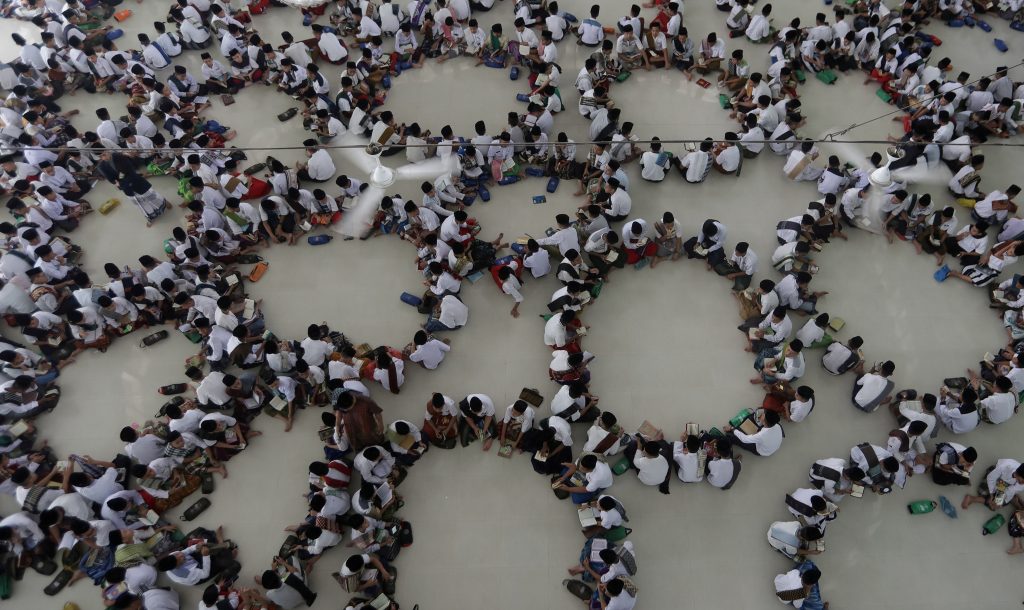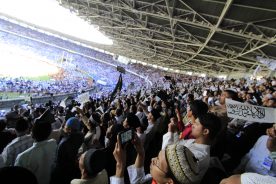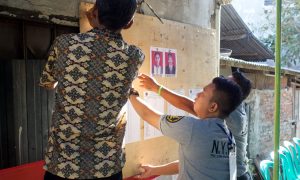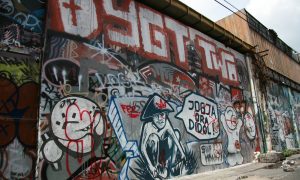At first glance, Indonesia’s largest Islamic organisation, Nahdlatul Ulama (NU), has never been in a stronger position. It has a record number of members in cabinet. It enjoys close relations with the president, Joko Widodo (Jokowi), has privileged access to the corridors of power and is the beneficiary of increasingly generous largesse from the state, all of which are boosting the range of services and opportunities that it can provide to its vast membership. NU’s president, Ma’ruf Amin, is also the chairman of the influential Indonesian Ulama Council (MUI) and numerous other senior nahdliyyin (NU members) hold strategic positions in the bureaucracy, state-owned enterprises and the corporate sector. NU’s campaign to promote its “moderate”, culturally embedded Islam Nusantara (Archipelagic Islam) concept has won government endorsement and attracted international attention. In short, NU’s status as the pre-eminent Islamic organisation in Indonesia has never seemed more secure.
A closer look, however, suggests that the organisation’s position is more vulnerable and its future more uncertain than its current exuberant confidence might indicate. Indeed, NU is to an extent emblematic of some of the challenges facing Indonesia’s civil society more broadly. Among these are the increasing influence of conservative views at the grassroots, the hazards of engagement with party politics, and the increasingly blurred boundary between the state and civil society as the latter seeks to capture state resources, and governments seek to co-opt civic organisations such as NU to service their goals.
Riding high
NU leaders are fond of declaring that their organisation is enjoying unprecedented prominence in national life. They refer to its status as by far the largest civil society organisation in Indonesia, with a claimed membership of 40-45 million (more than double that of the next biggest organisation, Muhammadiyah), but also cite survey data that indicates perhaps as many as 100 million Indonesians have a “religio-cultural affiliation” with NU, thus giving it immense potential influence. They also refer to the number of nahdliyyin in Jokowi’s cabinet—currently seven—as exceeding the past record of six in Sukarno’s bloated 100-minister cabinet of the early 1960s. In addition to this, there are hundreds of NU members holding high executive office in regional governments and state-owned enterprises across Indonesia as well as positions in the corporate sector. As one member of the NU Central Board (known by its Indonesian acronym, PBNU) member boasted, “If the organisation has a problem, we just contact one of our nahdliyyin in important positions and they fix it.”
Jokowi has been well disposed to NU, particularly since the massive Islamist mobilisation against his erstwhile political ally, Basuki Tjahaja Purnama (Ahok), the then governor of Jakarta, in 2016–17. In a move to buttress his support within the Muslim community and create a buffer against likely Islamist attacks that he is inimical to the faith, the president has assiduously cultivated NU. He now frequently attends NU events and shows deference to senior kiai (Islamic scholars). He also gives senior NU leaders privileged access to the palace. A prime example of this is Ma’ruf Amin, who helped legitimise the anti-Ahok protests in late 2016 and was once seen as at least unsympathetic to the president. Over the past year, Jokowi has duchessed Mar’uf, involving him in important events, lavishing praise upon him, and giving the impression that the kiai is now a trusted advisor and religious guide. In turn, Ma’ruf has gone from antagonist to helpful presidential ally, acting on several occasions to deflate issues that may have caused Jokowi difficulty.
Moreover, Jokowi has ensured an increasing flow of state resources to NU as part of his effort to lock in the organisation’s support. Following Ahok’s defeat, Jokowi visited PBNU seeking answers to why NU had not been more supportive of the governor, especially given the number of nahdliyyin in the cabinet. PBNU Chairman Said Aqil Siroj and other PBNU members bluntly told the president that although there maybe NU members in the ministry, NU itself had received little benefit directly from Jokowi’s government and that many of the organisation’s social and economic programs were struggling from a lack of funding.
As a result, Jokowi directed his ministers to work with NU in devising credible programs that might qualify for government support. He also pushed for NU to receive state land as part of a land redistribution program as well as access to microcredit schemes run through pesantren (Islamic boarding schools), known as Sharia Micro-Finance Financial Institutions or LKMS. Although the direct benefit to NU from these arrangements is as yet small, the organisation nonetheless sees the potential for major rewards from Jokowi’s initiatives.
Last of all, Jokowi has taken up NU’s notion of Islam Nusantara. The term Islam Nusantara has been in circulation for decades, having been popularised by academics such as Azyumardi Azra in the 1980s. But over the past five years NU has given the concept a far more specific focus, using it to extol the virtues of a culturally sensitive and predominantly Javanese Islamisation process and to explicitly reject what it sees as Arabised forms of the faith, such as Salafism and Muslim Brotherhood-style Islamism. At its 2015 congress, NU adopted Islam Nusantara as a conceptual pillar, both domestically and also internationally—a move strongly endorsed by the president. Jokowi has used global forums to promote Islam Nusantara as a template for religious moderation and an antidote to radicalism. Counter-terrorism agencies and the Ministry of Foreign Affairs have since incorporated aspects of Islam Nusantara into their programs and messaging, which has emboldened NU leaders to claim that their understanding of Islam is now entrenched in official state doctrine.
For its part, NU has served the immediate political interests of Jokowi. When Jokowi was seeking to crack down on the Islamist group Hizbut Tahrir Indonesia (HTI) in early 2017, NU youth groups obligingly began confronting HTI activists on the streets, sometimes leading to clashes, while calling on the government to dissolve the organisation for its “divisive” and “seditious” doctrines. In June of that year, the government duly proscribed HTI, citing inter alia the social unrest that increasingly surrounded the organisation’s public activities. NU welcomed HTI’s banning and validated the government’s justifications. It is difficult to avoid the conclusion that various NU leaders collaborated with the palace to create conditions that enabled the government to act against HTI. HTI’s banning served as a warning to other Islamist groups that Jokowi was willing to take strong action against them.
PKB-isation of NU
NU has always confronted tensions between its role as a civic organisation and its potential effectiveness as the basis of a political movement. Nowhere have such tensions been more apparent than in debates over NU’s relationship with political parties, particularly those that claim association with it. , At the height of the New Order regime in the 1980s, NU adopted a policy of avoiding direct involvement in politics, supposedly returning the organisation to its founding charter of 1926. This charter forbade members from simultaneously holding executive positions in both NU and a political party and also prevented NU from directing members to support a particular political party. After the end of the New Order in 1998, PBNU facilitated the establishment of Partai Kebangkitan Bangsa (PKB) as a nahdliyyin-based party by its then chairman, Abdurrahman Wahid (Gus Dur)—though it was careful to avoid open endorsement of PKB.
Despite the organisation’s putative political neutrality, the NU leadership has in practice taken a flexible approach to politics in the post-Soeharto era, often showing clear preference for PKB over other parties—especially the United Development Party (PPP), which has been dominated by nahdliyyin since 1999. PKB’s electoral fortunes have been dependent on it having good relations with NU. When NU tacitly supported PKB in the 1999 and 2004 elections, the party won more votes than any other Islamic party (12.6% and 10.6% respectively); when relations were frosty, as was the case in 2009, PKB’s vote fell below 5%.
NU and PKB became more closely bound from 2014, largely as a result of a clever strategy by the party chairman, Muhaimin Iskandar. In the run-up to the election that year, Muhaimin feared that PKB was at risk of not meeting the 3.5% threshold needed to gain parliamentary representation and he devised a two-part strategy to win back unequivocal NU support. The first part of the strategy was to tie the party to NU by channelling funds and committing assets. All PKB parliamentary wings at the national and regional levels were instructed to give monthly payments to NU for administrative purposes, derived from a levy on all PKB legislators. Its politicians furthermore used their positions in legislatures to secure funds for NU social and religious programs. PKB also guaranteed that in the event the party was dissolved, all its assets would be transferred to NU.
The second part of Muhaimin’s strategy revolved around gaining the patronage of a wealthy entrepreneur who could fund election-related programs in NU communities in PKB’s heartland electorates in East and Central Java. With the help of a senior political broker, Muhaimin persuaded the Chinese Christian owner of Lion Air, Rusdi Kirana, to join the party and become its deputy chairman. Rusdi then provided substantial funding for PKB outreach to local kiai in key electorates as well as entrepreneurship programs for young NU businesspeople. Both these strategies proved highly successful. In the election campaign, both Said Aqil and Ma’ruf Amin gave symbolic support to PKB and many NU kiai openly endorsed the party. PKB achieved 9% at the election, making it once again the highest-ranked Islamic party.
The 2015 NU congress in Jombang, East Java, further tightened links between NU and PKB. Muhaimin, in concert with his brother Halim Iskandar, the provincial PKB chairman, and Saifullah Yusuf, the East Java deputy governor and gubernatorial aspirant, exerted considerable sway over the conduct of the congress and ensured that Said Aqil and Ma’ruf Amin, both of whom were deemed favourable to PKB, would fill the two most senior positions for the next five years. Ma’ruf is a former PKB politician and his daughter is a former PKB legislative candidate. Said had appeared in PKB campaign materials in 2014 and his daughter is married to the brother of leading PKB parliamentarian Helmy Faishal Zaini.
The composition of the next PBNU made clear PKB’s penetration of the NU leadership. Helmy was appointed to the pivotal administrative position of secretary-general. The secretary of the Syuriah (the paramount Religious Advisory Board), Yahya Staquf, also has a daughter who is a PKB legislator. Saifullah Yusuf, whose gubernatorial prospects rely heavily on PKB, is on the central board, as also are numerous other NU luminaries with political or family connections to PKB. Intermarriage between elite NU families is common but the extent of kinship ties between the current most senior NU and PKB leaders is unprecedented.
Many non-PKB politicians and apolitical kiai argue that NU is now a partisan organisation and the organisation’s fate is too closely bound to that of PKB, thus breaching the principle that NU represent and serve equally all its members, regardless of political affiliation. While there is some substance to this charge, NU has nonetheless bargained effectively with national and regional governments over the past few years to secure concessions to its own advantage with no direct benefit to PKB.
A challenging future?
Despite NU’s recent successes, many in the organisation have concerns about the impact of shifting religio-cultural preferences, as well as structural changes in Indonesian education. The bedrock of NU has always been the role of the many thousands of pesantren and the kiai who lead them. The kiai have traditionally been revered religious, social, and often political, leaders to their communities, with the most important kiai commanding high status in national affairs. Their pesantren have been critical to shaping the spiritual lives and social outlook of millions of Muslims, particularly through the transmission of traditionalist understandings of Islam.
But the roles of kiai and pesantren are changing rapidly. There is abundant evidence that kiai now have little political sway over the electoral behaviour of their followers. They also face growing competition from new types of media-savvy religious leaders whose methods appeal to ever larger audiences, especially in urban areas. Increasingly, Muslims are likely to seek spiritual guidance from a television preacher or convenient interactive website than from a learned, but less accessible kiai.
Pesantren too are under considerable pressure. Declining self-generated revenues and student demand for access to state universities have led to increasing integration of pesantren into the national education system, which has resulted in greater homogenisation of teaching content and the loss of distinctive patterns of instruction that had been so influential on past generations of students. In short, the significance of NU’s religious scholarship and educational institutions may well shrink over coming decades as large sections of the Muslim community pursue alternative methods of learning about and expressing their faith.
Where does Hizbut Tahrir Indonesia go from here?
International experience shows that the organisation can survive, even thrive, in the face of official bans.
Moreover, conservatism is rising in many sections of NU and along with it, support for Islamist activism. Sectarian anti-Shia and anti-Ahmadiyah sentiment is deeply held in NU communities in East and West Java, and PBNU was embarrassed by the large number of nahdliyyin who joined the anti-Ahok rallies—disregarding the central board’s appeals not to mobilise. NU’s leaders admit to hesitancy in responding to popular Islamist activism, lest their inability to persuade members to a particular view be publicly exposed, as it was during the Jakarta elections.
Last of all, political fluctuations may also disadvantage NU. Although Jokowi appears well placed to be re-elected, the possibility of a victory by a rival candidate who is less favourable to NU, such as Prabowo Subianto or Anies Baswedan, cannot be ruled out. In such circumstances, NU’s proximity to PKB and Jokowi would limit its ability to manoeuvre with the new government.
None of these challenges are likely to dramatically reduce NU’s ability to be a major force in Indonesian public life for decades to come, but the nature and significance of its contribution may well change. All major Islamic organisations face threats from an increasingly individualised, market-driven religious culture, as well as from an ever-more state-controlled educational environment. Strengthening conservative sentiment will also influence the future leadership and doctrine of NU. It may well be that changes in public preference and political context leave Indonesia’s largest religious organisation more likely to be following, rather than initiating, the direction of national discourses.
 Facebook
Facebook  Twitter
Twitter  Soundcloud
Soundcloud  Youtube
Youtube  Rss
Rss 



